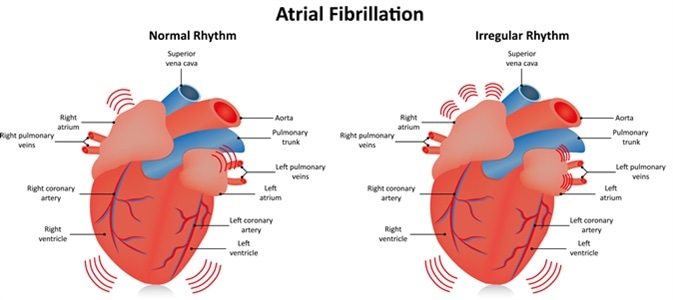
Low Carb Diets and Atrial Fibrillation
Skip to:
- What are Low Carb Diets?
- Implications of Low Carb Diets
- Low Carb Diets and Atrial Fibrillation
- How do Low Carb Diets Lead to Atrial Fibrillation?
- How Important is the Research?
With more awareness of the health implications of being overweight and increased access to dietary plans, a growing number of people are adopting low carb diets such as Atkins and the ketogenic diet to manage their health. Despite, their potential health benefits, recent research has found that following such diets may lead to heart issues.
What are Low Carb Diets?
Low carb diets have become increasingly popular over the years due to their perceived ability to aid weight loss. There is a variety of different low carb diet plans to choose from. However, they all mostly work on the premise that, by lowering levels of insulin, the body’s cardiometabolic function can improve, and as a result, trigger weight loss. This particular notion is commonly referred to as the carbohydrate-insulin model.

Low carb. Ossile / Shutterstock
Implications of Low Carb Diets
Recent research has found that removing carbohydrates from your diet may cause heart issues. Specifically, it has been suggested that those consuming a lower proportion of their total daily calorie intake from foods such as starchy vegetables, and fruits and grains may have an increased likelihood of developing atrial fibrillation (AFib) - one of the most commonly diagnosed heart rhythm disorders. AFib, a sub-type of arrhythmia, is characterized by an abnormally fast or irregular heartbeat. Those with AFib can often experience a series of symptomology including:
- Irregular or quicken heart rate. For some, this may be more than 100 beats per minute
- Heart palpitations
- Dizzy spells
- Tiredness
- Shortness of breath

Atrial Fibrillation - Image Credit: Joshya / Shutterstock
Some people with AFib may be unaware of their irregular heartbeat due to a lack of noticeable symptoms. However, those with the condition are approximately five times more likely to suffer from a stroke and can experience heart failure.
Low Carb Diets and Atrial Fibrillation
A large community-based cohort study examined over 13,000 participants’ health records over a 20-year period. The study was the first of its kind and largest to investigate the links between AFib and carbohydrates. The researchers used data collated by the National Institute of Health’s study - Atherosclerosis Risk in Communities (ARIC) - which began in 1987 and included five follow-ups between 1990 – 2013.
Over the longitudinal study, participants were required to indicate their daily food intake from a 66-item food questionnaire. From this, the researchers were able to calculate the proportion of calories that were derived from carbohydrates. For most participants, carbohydrates made up approximately 50% of their daily calories. It is recommended that American adults consume 45-65% of their calories from carbohydrates.
In order to ascertain AF, ECG data were collected during examinations as well as through the analysis of death certificates and hospital records. Upon analysis, it was found that across the 20-year period, 13.5% of participants developed AF. Those who did develop AF were more likely to do so if they followed a low-carbohydrate diet, compared to those with a higher proportion of carbohydrates comprising their diet.
How do Low Carb Diets Lead to Atrial Fibrillation?
There are several processes in which low carbohydrate diets might lead to the onset of AFib. It is suggested that those following low carb diets might also consume fewer grains, fruits, and vegetables which have well-researched anti-inflammatory properties. Therefore, without these foods in their diet, a greater amount of inflammation may occur, which is associated with AFib. Furthermore, AFib can occur due to increased consumption of fat and protein in place of carbohydrates which can result in oxidative stress, which research suggests is linked to AFib.
How Important is the Research?
This study’s findings align with a body of literature, several of which have demonstrated that diets both high and low in carbohydrates are linked to increased mortality. This study differed from previous ones as they did not measure the extent to which the non-carbohydrate part of the participant’s diet affected the pattern. However, the researchers noted that low carb diets were linked to an increased susceptibility of AFib regardless of the fat or protein-based products consumed in place of the carbohydrates.
One of the researchers working on the study noted that the long-term implications on carbohydrate-restricted diets are quite controversial, particularly in relation to cardiovascular disease. Based on this research, they recommended that following low carb diets to manage weight should be done so with caution. However, it is important to note that this research purely shows an association and therefore, cannot demonstrate a cause and effect relationship.
Further research is suggested in order for robust data and conclusions to be made as the research has several limitations such as not tracking those with asymptomatic AFib, as well as changes in participant’s diets following the completion of the questionnaire.
Sources
- Zhang, S., Zhuang, X., Lin, X., et al. (2019). Low-Carbohydrate Diets and Risk of Incident Atrial Fibrillation: A Prospective Cohort Study. Journal of the American Heart Association. DOI: https://doi.org/10.1161/JAHA.119.011955
- Oh R., & Uppaluri K. R. (2019). Low Carbohydrate Diet. StatPearls.https://www.ncbi.nlm.nih.gov/books/NBK537084/
- NHS. (2018). Overview: Atrial Fibrillation. https://www.nhs.uk/conditions/atrial-fibrillation/
Further Reading
Last Updated: Oct 10, 2019
.jpg)


































No hay comentarios:
Publicar un comentario